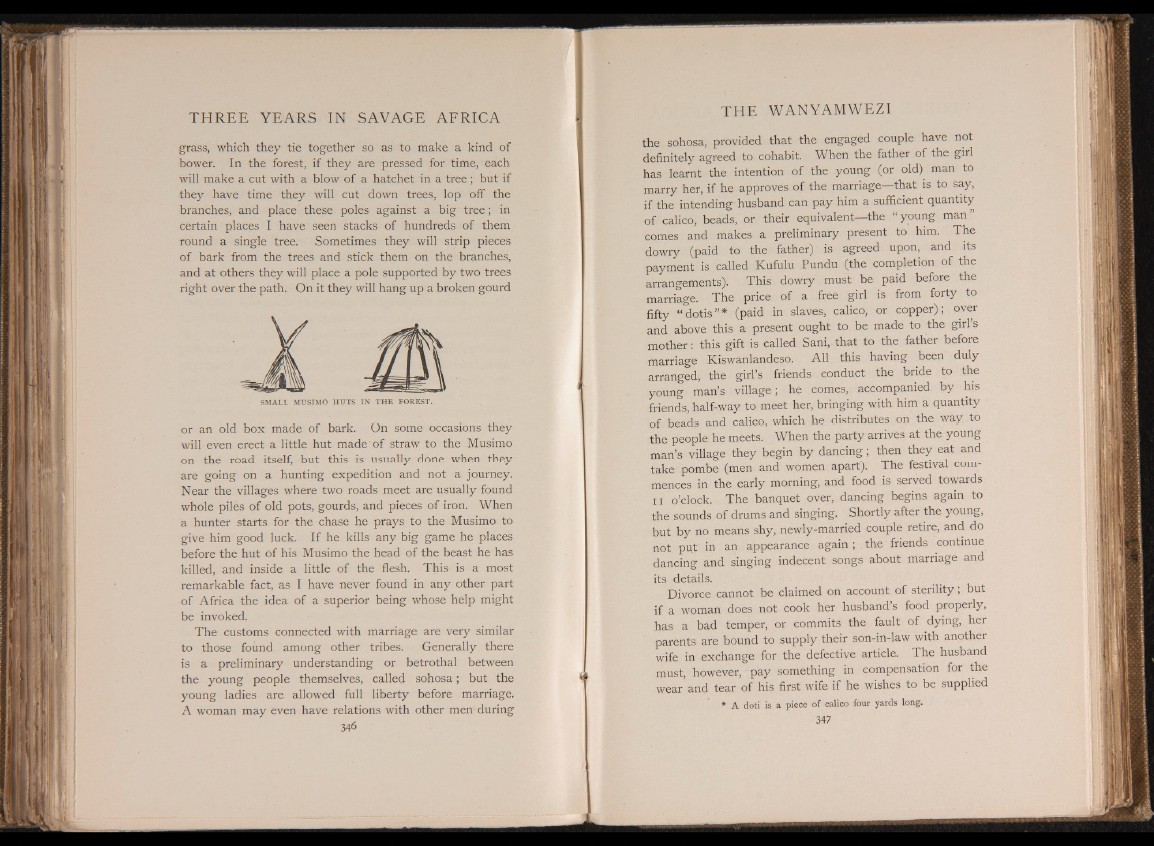
grass, which they tie together so as to make a kind of
bower. In the forest, if they are pressed for time, each
will make a cut with a blow of a hatchet in a tree ; but if
they have time they will cut down trees, lop off the
branches, and place these poles against a big tree; in
certain places I have seen stacks of hundreds of them
round a single tree. Sometimes they will strip pieces
of bark from the trees and stick them on the branches,
and at others they will place a pole supported by two trees
right over the path. On it they will hang up a broken gourd
SMALL MUSIMO HUTS IN TH E FOREST.
or an old box made of bark. On some occasions they
will even erect a little hut made of straw to the Musimo
on the road itself, but this is usually done when they
are going on a hunting expedition and not a journey.
Near the villages where two roads meet are usually found
whole piles of old pots, gourds, and pieces of iron. When
a hunter starts for the chase he prays to the Musimo to
give him good luck. If he kills any big game he places
before the hut of his Musimo the head of the beast he has
killed, and inside a little of the flesh. This is a most
remarkable fact, as I have never found in any other part
of Africa the idea of a superior being whose help might
be invoked.
The customs connected with marriage are very similar
to those found among other tribes. Generally there
is a preliminary understanding or betrothal between
the young people themselves, called sohosa; but the
young ladies are. allowed full liberty before marriage.
A woman may even have relations with other men during
346
the sohosa, provided that the engaged couple have not
definitely agreed to cohabit. When the father of the girl
has learnt the intention of the young (or okty man to
marry her, if he approves of the marriage—that is to say,
if the intending husband can pay him a sufficient quantity
of calico, beads, or their equivalent—the “ young man 1
comes and makes a preliminary present to him. The
dowry (paid to the father) is agreed upon, and its
payment is called Kufulu Pundu (the completion of the
arrangements). This dowry must be paid before the
marriage. The price of a free girl is from forty to
fifty “ dotis” * (paid in slaves, calico, or copper); over
and above this a present ought to be made to the girl’s
mother: this gift is called Sani. that to the father before
marriage Kiswanlandeso. All this having been duly
arranged, the girl’s friends conduct the bride to the
young man’s village; he comes, accompanied by his
friends, half-way to meet her, bringing with him a quantity
of beads and calico, which he distributes on the way to
the people he meets. When the party arrives at the young
man’s village they begin by dancing; then they eat and
take pombe (men and women apart). The festival commences
in the early morning, and food is served towards
u o’clock. The banquet over, dancing begins again to
the sounds of drums and singing. Shortly after the young,
but by no means shy, newly-married couple retire, and do
not put' in an appearance again ; the friends continue
dancing and singing indecent songs about marriage and
its details.
Divorce cannot be claimed on account of sterility; but
if a woman does not cook her husband s food properly,
has a bad temper, or commits the fault of dying, her
parents are bound to supply their son-in-law with another
wife in exchange for the defective article. The husband
must, however, pay something in compensation for the
wear and tear of his first wife if he wishes to be supplied
* A doti is a piece of calico four yards long.
347